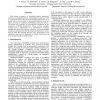Free Online Productivity Tools
i2Speak
i2Symbol
i2OCR
iTex2Img
iWeb2Print
iWeb2Shot
i2Type
iPdf2Split
iPdf2Merge
i2Bopomofo
i2Arabic
i2Style
i2Image
i2PDF
iLatex2Rtf
Sci2ools
111
Voted
ISQED
2005
IEEE
2005
IEEE
Reliability-Centric Hardware/Software Co-Design
This paper proposes a reliability-centric hardware/ software co-design framework. This framework operates with a component library that provides multiple alternates for a given task, each of which is potentially different from the others in terms of reliability, performance, and area metrics. The paper also presents an experimental evaluation of the proposed co-design framework using several example designs and a comparison to a conventional co-design method that does not consider reliability. Our experimental evaluation demonstrates that the proposed framework can be used to study the tradeoffs between area, performance, and reliability, and that it is important to include reliability as a first class parameter in optimization.
Co-design Framework | Conventional Co-design Method | Hardware | ISQED 2005 | Software Co-design Framework |
Related Content
| Added | 25 Jun 2010 |
| Updated | 25 Jun 2010 |
| Type | Conference |
| Year | 2005 |
| Where | ISQED |
| Authors | Suleyman Tosun, Nazanin Mansouri, Ercument Arvas, Mahmut T. Kandemir, Yuan Xie, Wei-Lun Hung |
Comments (0)

